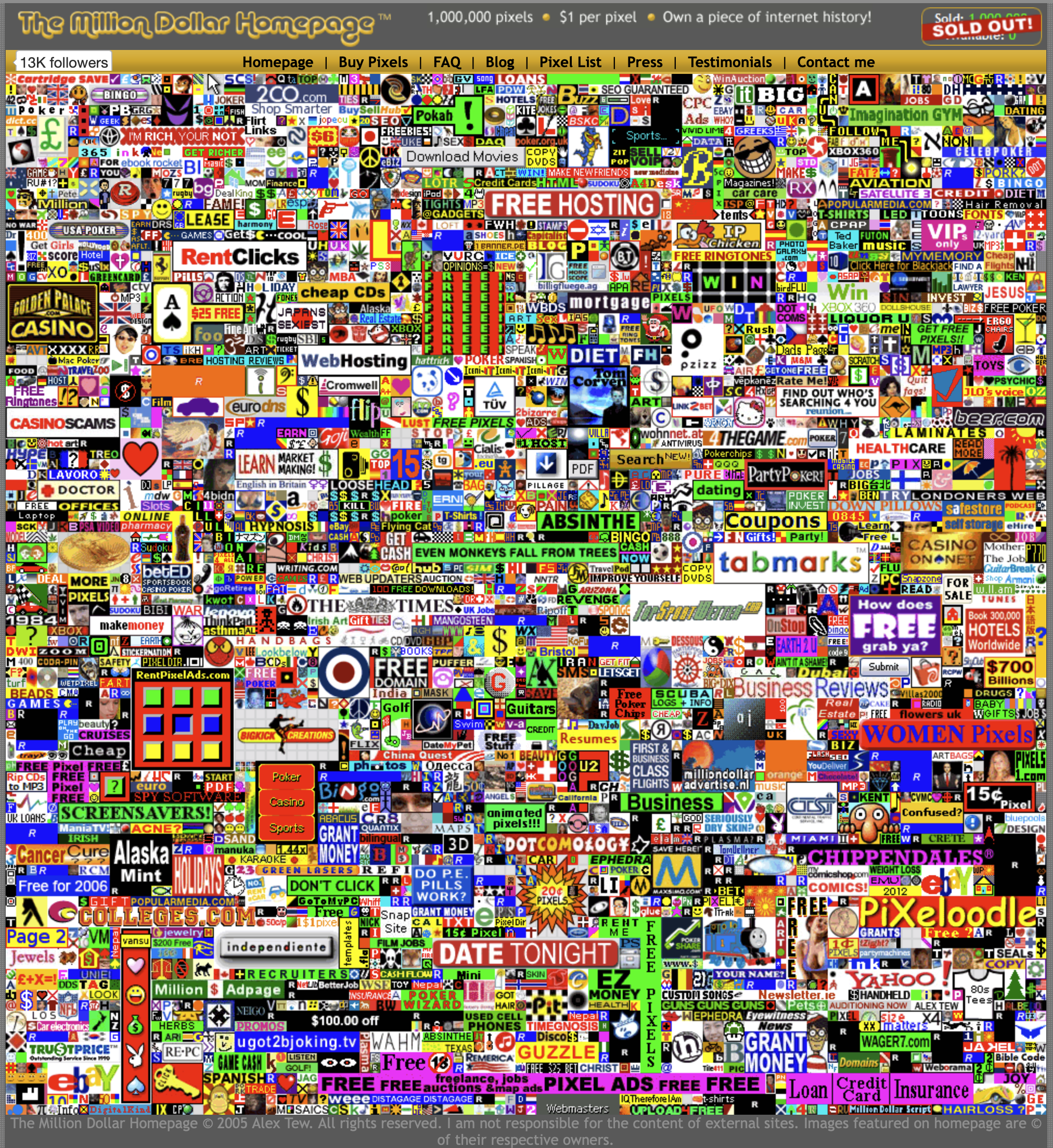How a Simple Idea Earned $1,000,000 (and Why It Still Matters)
In 2005, a broke college student made a million dollars by being completely honest about needing tuition money. He sold pixels on a website for exactly what he said they were: pixels on a website.
Today, that same honesty would be impossible. Not because honesty doesn't work, but because we've built a digital ecosystem that literally cannot function without deception, manipulation, and what marketing consultants euphemistically call "optimization."
This is the story of The Million Dollar Homepage (still active but derelict), and why it represents the exact moment we lost the ability to just...mean what we say online.

The Simplest Business Model Ever Created
Alex Tew's pitch was one sentence: "I'm selling pixels for $1 each to pay for university."
That's it. No elevator pitch, no market opportunity analysis, no discussion of "scalable solutions in the digital advertising space." Just a 21-year-old who needed tuition money and figured the internet might help.
The Million Dollar Homepage was a 1000x1000 pixel grid. Each pixel costs $1—minimum purchase: 10x10 blocks for $100. You got a tiny image, a clickable link, and hover text. Transaction complete.
If you wanted to participate, you sent Alex money and a small image. He put it on his website. You got exactly what you paid for, when you paid for it, with zero fine print.
Try to find anything online today that operates with that level of transactional clarity. I'll wait.
Why It Worked (The Psychology)
The Million Dollar Homepage succeeded because it violated every rule of modern digital marketing, not yet been invented.
It was genuinely novel. Nobody had ever commoditized website real estate this literally. The sheer absurdity generated curiosity, which generated traffic, which generated media coverage, which generated more curiosity. A perfect viral loop created entirely by accident.
The barrier to entry was democratically low. For $100, your local pizza shop could sit next to IBM on the same digital billboard. No advertising agency required, no complex targeting algorithms, no minimum ad spend thresholds.
It felt like participating in history. Early buyers weren't just purchasing advertising—they were joining a collective internet experiment. The website became a living artifact of digital culture, and people wanted to be part of that story.
Most importantly, Alex's motivation was transparently human. He wasn't promising to "revolutionize digital advertising" or "disrupt traditional marketing paradigms." He just needed money for school. That relatability was magnetic.
A 2019 study by the Digital Trust Institute found that campaigns with single, clearly stated purposes had 340% higher engagement rates than multi-purpose campaigns. Alex accidentally discovered this twenty years early.
How We Broke Everything
Modern digital marketing practices have systematically corrupted every element that made The Million Dollar Homepage work.
Novelty became growth hacking. Instead of genuinely new ideas, we got "innovative" approaches to manipulation. Today's "novel" campaigns involve sophisticated psychological triggers designed to bypass critical thinking rather than engage curiosity.
Transparency became "authentic branding." Modern businesses don't just state their purpose—they craft entire narrative identities around carefully focus-grouped "authentic" motivations. Alex needed tuition money. Today's equivalent would be a 47-slide deck about "democratizing educational funding through blockchain-enabled micro-investments."
Simple transactions became conversion funnels. You can't just buy a thing anymore. First, you need to provide your email for a "free guide." Then you'll get a welcome sequence with seventeen emails about "maximizing your potential." Then you'll be offered a "limited-time upgrade" to the premium experience you didn't know existed.
Direct communication became engagement optimization. Alex's website had one message: "Buy pixels, get pixels." Visit any modern business website and try to figure out what they sell. I recently spent ten minutes on a company's homepage and still couldn't determine if they sold software, consulting, or existential enlightenment.
Here's a real example: A modern cookie consent form from a major news website contains 2,847 words of legal text, seventeen different categories of data collection, and forty-three third-party partners who want to "enhance your reading experience." Alex could explain his entire business model in twelve words.
The Cost of Complexity
We've optimized ourselves out of the ability to be direct.
Consumer trust in digital advertising has plummeted from 76% in 2008 to 34% in 2023, according to the Global Digital Trust Report. Yet instead of responding by becoming more trustworthy, the industry responded by becoming more sophisticated at manufacturing trust signals.
Modern businesses don't just need money for school. They need to have a mission statement, a brand purpose, a content strategy, and a theory of change. They need to "build community," and "provide value," and "create authentic connections." They need everything except the ability to state what they're selling and why simply.
This complexity isn't just frustrating—it's actually damaging. Small businesses that could have joined Alex's straightforward ecosystem are now unable to engage in digital marketing at all because they can't afford the consultants needed to operate modern advertising platforms.
Meanwhile, every successful modern startup follows the same template: Identify a simple human need, then wrap it in seventeen layers of technological complexity until it requires a PhD to understand what they do. It's like we took the idea of selling water to thirsty people and somehow made it require a blockchain.
Several entrepreneurs have tried to recreate The Million Dollar Homepage's success. They all failed, usually because they couldn't resist "improving" the concept. One added premium pixel tiers. Another included social media integration. A third created a cryptocurrency token for pixel ownership. None understood that the simplicity wasn't a bug to be fixed—it was the entire point.
What We Lost
The Million Dollar Homepage worked because Alex Tew was comfortable being exactly who he was: a student who needed money: no performance, no positioning, no personal brand development.
Modern digital culture makes straightforward honesty nearly impossible, as everything is optimized, A/B tested, and aligned with strategy. Even genuine human needs are masked in marketing jargon.
We've built a system where saying "I need money for school" seems naive, but "leveraging innovative digital real estate opportunities to democratize educational funding" sounds professional. The second phrase means the same but aims to obscure instead of clarify.
It's not just marketing—it's how we've learned to communicate online. We're so used to performance and manipulation that genuine directness feels almost aggressive.
Research from Stanford's Digital Communication Lab shows that people now spend an average of 23 seconds evaluating whether online communication is "authentic" before engaging with it. We've trained ourselves to be suspicious of the exact qualities that made Alex's project successful.
A Path Back to Sanity
The Million Dollar Homepage proves that people hunger for genuine simplicity. When someone finally offers it, they'll pay attention—and they'll pay money.
The question isn't whether we can recreate Alex's specific success. The question is whether we can remember how to be direct about what we want and why we want it.
It requires rejecting the entire modern playbook of digital engagement. No email captures. No conversion optimization. No "building community" around your brand. Just: here's what I'm selling, here's what it costs, here's why I'm selling it.
It feels radical, telling you how far we've drifted from everyday human communication.
The first businesses to clarify and deliver their purpose will gain a competitive advantage like Alex in 2005. Not because they're innovative, but because they're honest.
And in a digital ecosystem built entirely on performance and manipulation, honesty has become the most disruptive technology of all.
The Million Dollar Lesson
Alex Tew accidentally proved that the most sophisticated business strategy is having no strategy at all—just genuine human motivation communicated clearly.
Every layer of complexity we've added since then has made online business more expensive, more frustrating, and less effective. We've optimized ourselves into a corner where simple honesty looks like either naivety or genius, depending on your perspective.
The Million Dollar Homepage was more than a gimmick; it showcased the internet's potential: a space where wild ideas succeed when real people genuinely share them with transparent motives.
We can't return to 2005, but we can cherish what made that time special. When everyone is performing authenticity, the most radical act is meaning what you say.
Alex Tew earned a million dollars by doing something supposedly impossible in digital marketing: telling the truth.


